Dreams boss Mike Logue admits the prospect of turning around the failing beds business intimidated him when he took the job in August 2013.
Greeted by sub-standard product, disengaged staff and dissatisfied customers, he had his work cut out. “Coming into the business, seeing the product and reading the customer letters and staff feedback was scary,” he says.

But Logue’s days of heading up a loss-making business are firmly behind him.
“We were planning for EBITDA of £15m last year,” he says. “We went through that significantly. The business has gone from losing £5m a year to making £21.8m in the space of two years. We are only in the second year of a three year plan but we are a year ahead of schedule.
“Yes, the timing is good as the market has improved but we are improving at three to four times the market rate. The speed of this journey has been incredible.”
That speed has been fuelled by “product and people”, according to Logue, as well as £18m investment from owner Sun Capital over the last three years.
“We see from internal surveys that our engagement levels have gone from being in a dark place two years ago to employees understanding our company values”
Mike Logue, Dreams
“Our employees are delivering 23% more sales per person than they were two years ago,” he says.
“Our team is engaged. We see from internal surveys that our engagement levels have gone from being in a dark place two years ago to employees understanding our plan and understanding our company values.”
Dreams’ 2015 financial results
- EBITDA up 207% to £21.8m in year to December 23 2015
- Like-for-likes climbed 19.4% over full-year and 30% in H2, which management says has continued into 2016
- Total revenue now stands at £234m, up 16.2%
Growing conversions
That 23% sales increase per head has been accompanied by a sales conversion rate that has jumped from 14% to just under 20%.
Meanwhile sales per square foot have jumped from £111 in 2013 to £146 in 2015. That is down to better product, engaged staff and revamped stores, says Logue.
Factory productivity has also improved; employees are producing 30% more parts per person than they were two years ago.
Investment in machinery and restructuring has contributed significantly, as has increased engagement among factory employees.

Logue inherited a returns rate of more than 13% when he joined the business two and a half years ago, just after it had been bought out of administration. That figure has now shrunk to below 5%.
That reduction has been powered by an overhaul of the way Dreams approaches its Asian manufacturing plants.
“We now have a quality and assurance team inspecting factories and product in Vietnam and Southern China,” Logue says. “The return level of that product is down to between 2% and 2.5%. In 2012/13, that level was 30%.”
The rigour which tackled that returns rate doesn’t stop in Southern China: if Dreams’ management sees an uplift on returns for any product its team in the Midlands aims to swiftly identify the problems, notifying the supplier of any issues.
“The supplier can then change it, it takes just days now to implement that change,” says Logue. “Before, the scale of the issue meant that you weren’t getting down to one or two issues like that on a Monday morning. There were so many returns that identifying problems was tough. We were inundated.”
Outside of Asia, Dreams is about to begin receiving product from Eastern Europe, with Logue keen to bring some of its external supply chain closer to home.
Part of Dreams’ current success is down to owning much of its own supply chain and fulfilment capabilities, from its Midlands factory to its own vans. “We make it, we sell it, we deliver it,” says Logue. “We’re in a good place.”
That model means Dreams is market-leading in the mattress industry and has grown its share of the wider bedroom furniture business to around 12%, although that figure is unaudited, due to lack of clear data.
Advances in distribution
While Logue is happy with the progress that the business is making in its factories and stores, there is more to do across its distribution network.

“We still have some work to do on the distribution side of things,” he says. “We spent £2m improving all our vans but we haven’t done the depots.
“And we need to invest in them in terms of pay. We recruit and retain the best in our shops and have paid above the living wage for a long time in store but we need to do the same in distribution.”
As well as improvements to its distribution network, Dreams’ management is reassessing its ranges. Logue put some categories under review when he joined.
“We came out of furniture over the past two years,” he says. “I really didn’t feel we could deliver it well. The rate of returns was very high and the net profitability was non-existent.
“We have focused on being a mattress and bedframe specialist but you will see us moving into the furniture space again”
Mike Logue, Dreams
“We have just launched into kids again and you will see us at tail end of 2016 addressing the gap in furniture.
“We should be a bedroom specialist – and you will see us moving into that again. We want to be the most recommended retailer in that space.”
Future prospects
Another venture Logue is currently considering is concessions: Dreams is in discussions with multiple department stores at the moment and will trial a concession model this year, possibly with more than one retailer.
Longer term, Logue is currently piecing together a new three-year strategy. While he stays tight-lipped on much of the detail, he says that a new web platform is on the list, together with other investments in technology, which will allow the retailer to get a single view of the customer.
As important as investments in technology are for the retailer, Logue is very aware that the majority of Dreams customers do not purchase online, and does not believe this will change dramatically in the short term.
“Our customers will want to try out our products in store for a long, long time to come,” he says. “But I think as the next generation comes that could change. This generation are buying seven colours of one dress and sending six back.
”As they come into mattress market in their mid-30s you will see people be more comfortable buying that sort of product online - and we will be ready for them.”
With one eye on the future, Logue is encouraged by the regeneration of the housing market, which has helped grow the beds market. One fifth of Dreams’ sales are associated with house moves so any movement is welcomed by Logue, although he is not banking on any government schemes coming to fruition regarding the building of new homes.
While Logue is bullish on the business of running Dreams he is more reticent to comment on its ownership prospects.
“I run the business. I didn’t buy it and I certainly won’t sell it. My role is to keep improving it”
Mike Logue, Dreams
Furniture peers DFS and SCS both floated in the past year but Logue refuses to be drawn on any exit strategy for Dreams.
“I run the business,” he says firmly. “I didn’t buy it and I certainly won’t sell it. My role is to keep improving it.
“And I trust Sun Capital. They have been an amazing partner. They have invested in so much and nothing has been an issue. I think we can keep growing, I see tremendous opportunity. But Sun will find the right route in the future.”

Logue does concede that he does not favour the prospect of a float. “I am not a huge fan of the ups and downs of stock markets,” he says. “I would far rather go down a trade sale route but it is not my decision. For now I am just excited to be running the business.”
And he is certainly not resting on his laurels. “We currently have a 9.2% profit margin,” he says. “The best in class that I have ever seen in US, UK and Europe in a vertically integrated business is 12%.
“My goal is to reach that. And with the revenue growth of new stores and continued efficiency I don’t see why we can’t do it.”
With what Logue and his team have achieved so far, you would not bet against him.
Store expansion
Dreams dramatically downsized after being bought out of administration. The beds specialist used to operate 270 stores, and it has 170 today.
But Logue sees scope for more. “We have identified 60 locations around the country that we don’t exist in but could do. We are looking at opening 20 stores each year for three years. But only if they continue to deliver rates of return that we’ve been seeing,” he says.

“ We did open 10 stores at end of last year that performed really well for us, particularly in the Northwest, and we are very cautiously looking at stores in locations such as Liverpool.
“There are also parts of the Midlands where we closed too many stores. And the great thing is that we know the sales figures for those stores, we know what they were making.”
New formats
Logue is not just eyeing more stores, but different sized formats too.
The average Dreams store today is 8,000 sq ft, down from 14,500 sq ft when Logue joined. He says anything above 8,000 sq ft “confuses” the customer with too much product.When he joined the business there were stores as big as 24,000 sq ft.
“That’s not required,” says Logue, who says he hopes to continue to reduce Dreams’ average footprint. At present it operates 50 stores above its target 8,000 sq ft.
In fact the retailer has opened a shop as small as 2,000 sq ft in Warrington which Logue identifies as a mattress specialists.
Dreams spent £5m on store renovations following customer concerns highlighted on the retailer’s Pillow Talk feedback tool. The investment took just six months to pay back, says Logue.
“Pillow Talk helps us to run the business,” he says. “And the need for store revamps was the most significant change to come from it.”
The retailer’s Dreams at Home format, which includes a Sabichi concession selling homewares, was a “toe in the water” when it first opened shortly after Logue joined.
Located in Watford, the store’s success has taken the business by surprise and it is now planning on opening a further two in Milton Keynes and Aylesbury.





















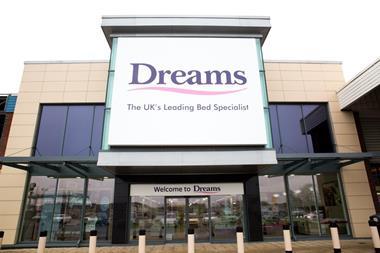
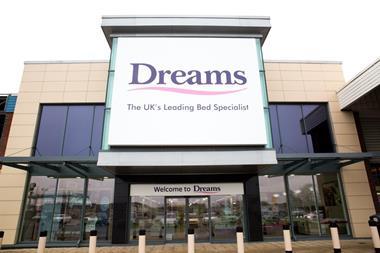
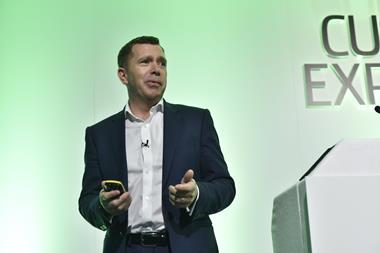
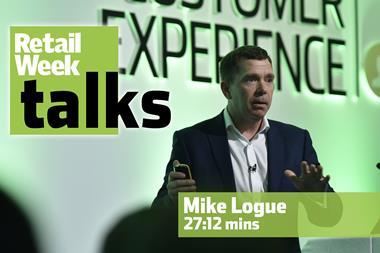
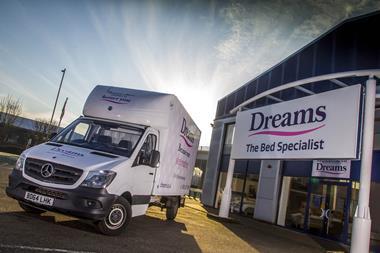
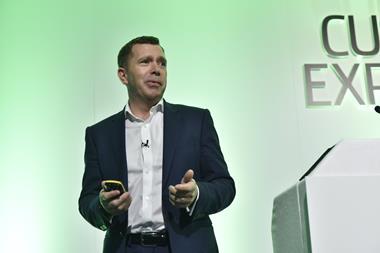
No comments yet